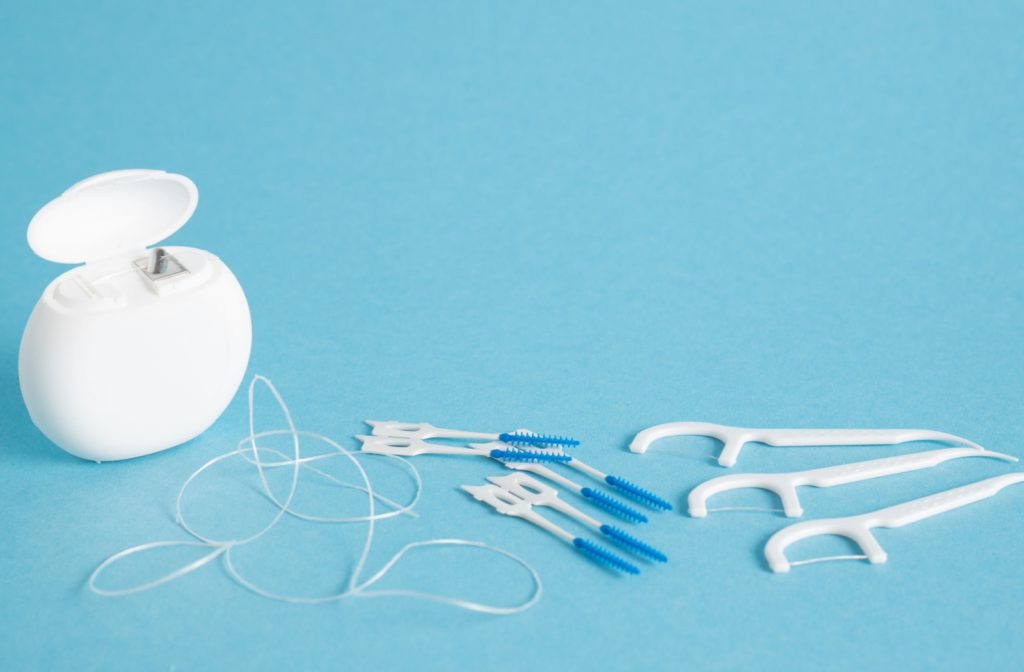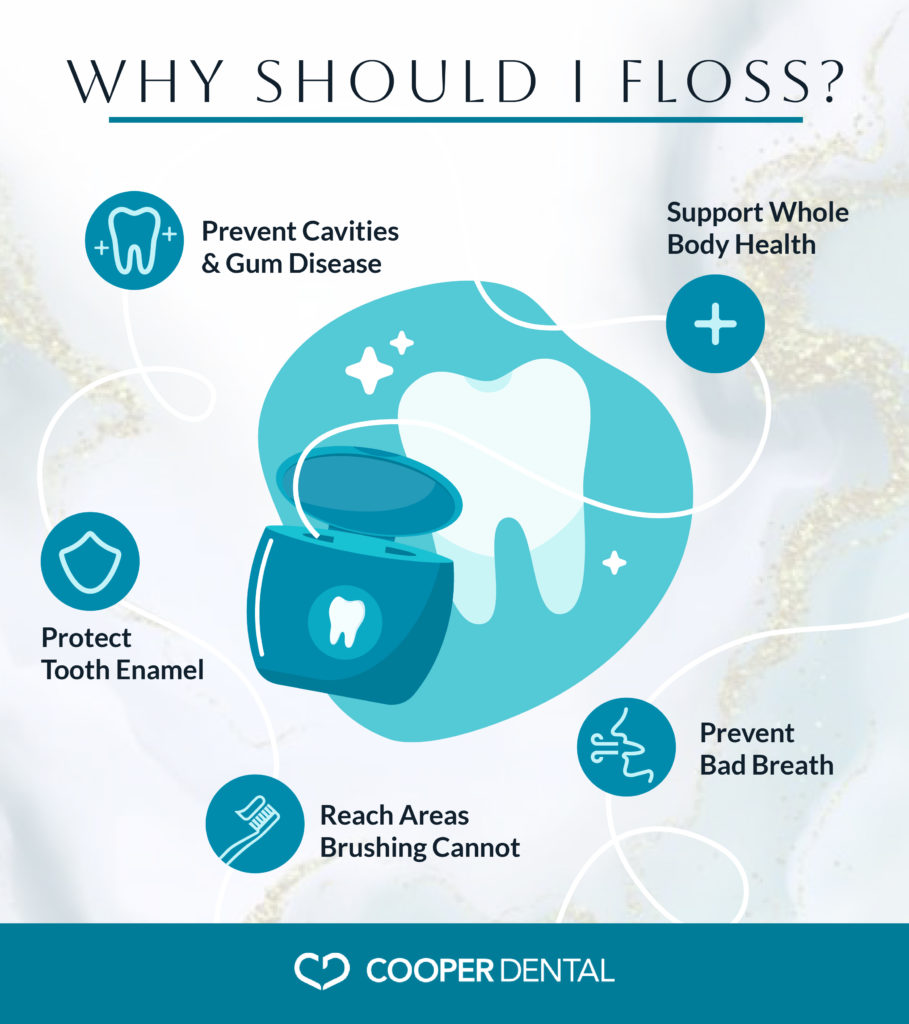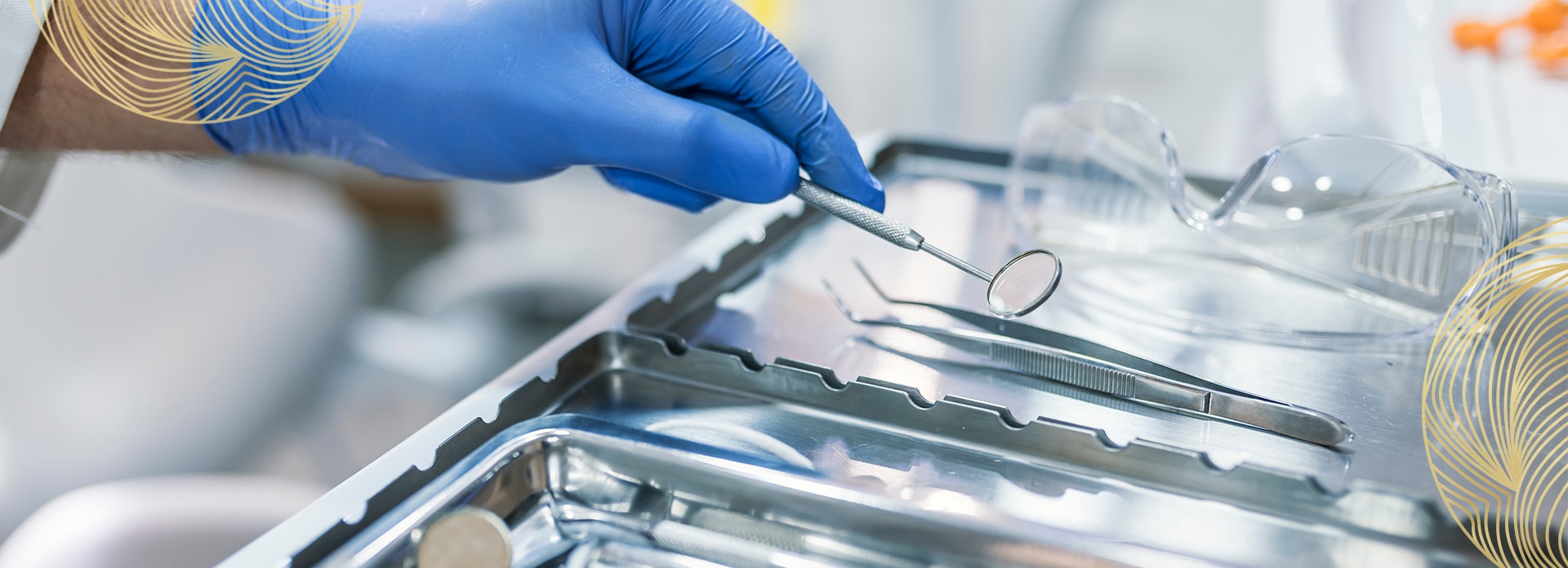Oral hygiene is about much more than just brushing twice a day. Following comprehensive oral care practices is essential for maintaining a healthy, clean mouth.
Flossing is one of the most significant yet often neglected facets of oral hygiene. While brushing cleans the surfaces of your teeth, flossing reaches the spaces between your teeth and below the gum line, removing plaque and food particles.
Flossing helps:
- Reach areas where brushing alone cannot
- Prevent cavities and gum disease
- Protect tooth enamel
- Prevent bad breath
- Protect your whole-body health
What Is a Proper Flossing Technique?
Dental flossing involves using a thin, flexible strand of material to reach areas that a toothbrush cannot.
Here are some tips for effective flossing:
- Use around 18 inches of floss (about the length of your forearm) and wrap most of it around your middle fingers, leaving about 1–2 inches to work with.
- Hold the floss tightly between your thumbs and index fingers and gently slide it up and down between your teeth.
- Curve the floss around the base of each tooth making a c-shaped motion, making sure to go below the gumline.
- Use a fresh section of floss for each tooth to avoid transferring food and bacteria.

Types of Dental Floss & Alternatives
Several floss options are available, each with its own benefits.
Traditional Dental Floss
Traditional dental floss is made of a thin strand of waxed or unwaxed nylon or Teflon, effectively removing plaque and debris between teeth. Waxed floss glides more easily between tight spaces, while unwaxed floss provides a bit more friction, which can be helpful for some.
Super Floss
Super Floss is a specialized dental floss designed for cleaning around braces, dental bridges, and other orthodontic appliances. Unlike regular floss, Super Floss has three distinct components: a stiffened end for easy threading under dental appliances, a spongy section that helps clean around appliances and in wider spaces, and a regular floss segment for cleaning between teeth.
Floss Threaders
Floss threaders are small, flexible tools designed to help people floss in hard-to-reach areas—particularly around braces, bridges, or permanent retainers. They look like a large, flexible needle and work by guiding dental floss underneath wires or around dental work where regular floss can’t easily reach.
Interdental Brushes
Interdental brushes are small, cone-shaped brushes that reach between teeth and around dental appliances, such as braces, bridges, or implants. They are especially useful for people with large gaps between teeth or periodontal pockets.
Floss Picks
Floss picks offer a convenient way to floss on the go, combining a small piece of floss with a plastic handle. These flossers can make it easier for those who find traditional flossing challenging. While they may not reach as deeply as traditional floss, they are a practical option for quick cleanups.
Water Flossers
Water flossers use pulsating water to remove plaque and debris between teeth and along the gumline. They can be particularly beneficial for individuals with braces, implants, or sensitive gums. Water flossers may be easier for some people to use than traditional floss.

5 Benefits of Regular Flossing
Brushing twice a day and flossing at least once a day are key to a clean mouth. Regular flossing offers several benefits.
- Flossing Helps Prevent Cavities & Gum Disease
Flossing helps prevent the formation of cavities between teeth by removing food particles and plaque that brushing leaves behind. It also helps prevent or reduce gum disease by removing plaque below the gumline. Consistent flossing habits can significantly reduce the incidence of tooth decay.
- Flossing Helps Protects Tooth Enamel
Flossing is essential for preserving tooth enamel. When plaque accumulates, and bacteria produce acids, these acids can erode tooth enamel. By flossing regularly, you remove the plaque and bacteria that cause enamel erosion, helping to keep your teeth strong and healthy.
- Flossing Reaches Areas Brushing Cannot
Toothbrushes excel at cleaning the visible surfaces of teeth, but they struggle to reach the narrow spaces between them. These interdental areas are prime spots for plaque and food particles to accumulate, leading to potential oral health issues. Dental floss is specifically designed to navigate these tight gaps, effectively removing debris and disrupting plaque buildup at the gumline.
- Flossing Helps Prevent Bad Breath
Flossing is crucial in combating bad breath by removing food particles and plaque that can accumulate in hard-to-reach spaces. When left to decay, food debris can produce unpleasant odours that contribute to halitosis (chronic bad breath). Regular flossing keeps these areas clean and helps maintain a healthy balance of bacteria in the mouth.
- Flossing Enhances Overall Health
There is a growing body of evidence linking oral health to overall health. Keeping your mouth clean can lower your risk of developing conditions like heart disease and is a key step in managing diabetes.
What Happens If You Do Not Floss?
Neglecting flossing can lead to serious oral health issues. Flossing reaches one-third of the tooth surface, which brushing does not.
Plaque buildup below the gumline can cause inflammation, leading to gum recession and gum disease. Gum recession may occur initially, which can also contribute to tooth sensitivity.
If inflammation and gum disease is left untreated, it can progress to periodontitis, a severe gum infection. This advanced form of gum disease can result in tooth loss and has been linked to other health complications.
Additionally, failing to floss allows plaque to harden into tartar, which can only be removed during a professional cleaning. This then extends the time and cost involved for your dental cleaning visits.
Plaque buildup also contributes to dental decay often between the teeth. Plaque is a sticky film of bacteria that forms on teeth after eating and drinking, particularly sugary or starchy foods.
When plaque isn’t removed, the bacteria within it produce acids that attack tooth enamel, leading to the gradual breakdown of this protective layer. Since the spaces between teeth are often harder to clean, plaque can accumulate more easily in these areas.
Over time, the persistent acid attack can create cavities between the teeth, where decay can progress unnoticed until it becomes more serious. This is why regular flossing and brushing is important to help remove plaque, reducing the risk of decay and maintaining oral health.

Make Flossing a Habit
Like any habit, flossing requires some commitment and consistency to become a routine. However, the benefits of regularly flossing far outweigh any initial effort or discomfort. Here are some tips:
- Set a schedule: Floss at the same time every day, such as before brushing your teeth in the evening.
- Keep floss handy: Store floss in a visible place to remind yourself to use it.
- Use a timer: Spend at least 1-2 minutes flossing for a thorough cleaning.
- Try alternatives: If traditional flossing is difficult, try alternatives, such as interdental brushes or water flossers, until you find something that works for you.
Your Oral Health Is Vital. Let’s Protect It.
Flossing is an integral part of maintaining good oral health. There is no reason to wait until your next dental appointment to start flossing regularly. Prioritize your oral health today by making flossing a daily routine.
If you have any concerns about your flossing technique or are due for a cleaning, call us today to book an appointment with Cooper Dental. A healthy smile starts with good oral hygiene practices. Happy flossing!




